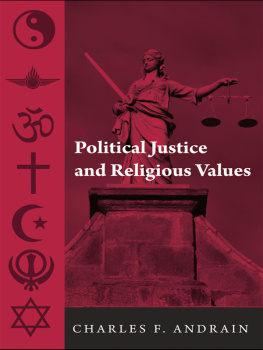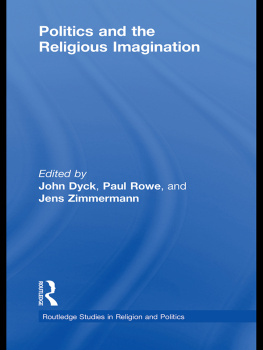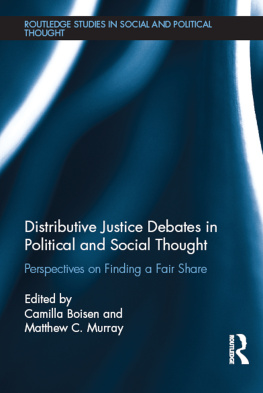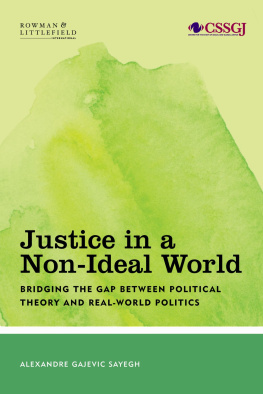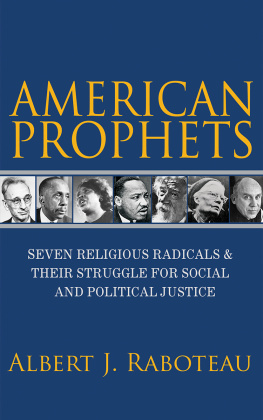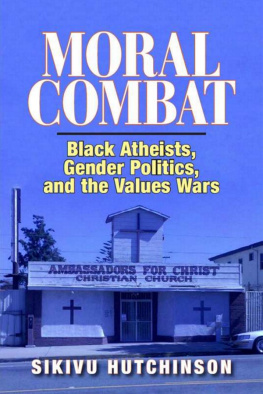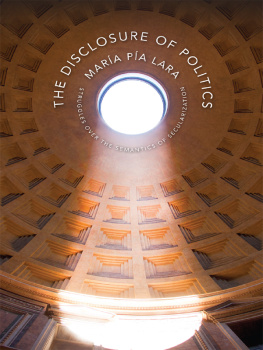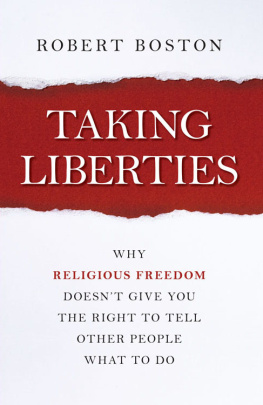POLITICAL JUSTICE AND RELIGIOUS VALUES
Political Justice and Religious Values explores the impact of theological interpretations of God, the individual, society, church, and government on attitudes toward procedural and distributive justice. Combining theories with evidence, the volume focuses on individual beliefs and national conditions that explain policy views about political justice. It blends information from diverse fields: political science, religion, sociology, psychology, and history. The approach clarifies ways that the U.S. context influences religious values and preferences for civil liberties, womens rights, and economic equality.
Charles F. Andrain is Professor Emeritus of Political Science at San Diego State University.
CONTEMPORARY SOCIOLOGICAL PERSPECTIVES SERIES
Edited by Valerie Jenness,
University of CaliforniaIrvine
and Jodi OBrien,
Seattle University
This innovative series is for all readers interested in books that provide frameworks for making sense of the complexities of contemporary social life. Each of the books in this series uses a sociological lens to provide current critical and analytical perspectives on significant social issues, patterns and trends. The series consists of books that integrate the best ideas in sociological thought with an aim toward public education and engagement. These books are designed for use in the classroom as well as for scholars and socially curious general readers.
Forthcoming:
- Hoop Dreams on Wheels by Ronald J. Berger
- GIS for the Social Sciences by Robert Nash Parker and Emily K. Asencio
- Sociology of Music by Michael B. MacDonald
- Inequality and the New Communication By James C. Witte
- Race, Justice and the New Genetics by Sandra Soo-Jin Lee
POLITICAL JUSTICE AND RELIGIOUS VALUES
Charles F. Andrain

First published 2008
by Routledge
270 Madison Ave, New York, NY 10016
Simultaneously published in the UK
by Routledge
2 Park Square, Milton Park, Abingdon, Oxon OX14 4RN
Routledge is an imprint of the Taylor & Francis Group, an informa business
This edition published in the Taylor & Francis e-Library, 2009.
To purchase your own copy of this or any of Taylor & Francis or Routledges collection of thousands of eBooks please go to www.eBookstore.tandf.co.uk.
2008 Taylor & Francis
All rights reserved. No part of this book may be reprinted or reproduced or utilized in any form or by any electronic, mechanical, or other means, now known or hereafter invented, including photocopying and recording, or in any information storage or retrieval system, without permission in writing from the publishers.
Library of Congress Cataloging in Publication Data
Andrain, Charles F.
Political justice and religious values / by Charles Andrain.
p. cm.
ISBN 978-0-415-98964-0 ISBN 978-0-415-98965-7
1. Religion and justice. I. Title.
BL65.J87A53 2008
261.8dc22 2007044034
Trademark Notice: Product or corporate names may be trademarks or registered trademarks, and are used only for identification and explanation without intent to infringe.
ISBN 0-203-92929-2 Master e-book ISBN
ISBN 10: 0-415-98964-7 (hbk)
ISBN 10: 0-415-98965-5 (pbk)
ISBN 10: 0-203-92929-2 (ebk)
ISBN 13: 978-0-415-98964-0 (hbk)
ISBN 13: 978-0-415-98965-7 (pbk)
ISBN 13: 978-0-203-92929-2 (ebk)
TABLES
Explanations for political attitudes
Hypotheses about civil liberties, legal abortion, and gender equality
Hypotheses about economic equality
Explanations for attitudes toward civil liberties, legal abortion, gender equality, and economic equality, 19982004
Explanations for attitudes toward civil liberties and gender equality, 1998
Impact of ideological and partisan identifications on policy preferences: mean scores
Impact of religious affiliation on attitudes toward civil liberties, legal abortion, gender equality, and economic equality: mean scores
Explanations for policy preferences among religious groups: mean scores
Explanations for policy preferences among religious groups: regressions
FOREWORD
This innovative series is for all readers interested in books that provide frameworks for making sense of the complexities of contemporary social life. Each of the books in this series uses a sociological lens to provide current critical and analytical perspectives on significant social issues, patterns and trends. The series consists of books that integrate the best ideas in sociological thought with an aim toward public education and engagement.
Political Justice and Religious Values provides an in-depth examination of the relationship between religion, cultural values and the contemporary politics of social justice. Many current books deal with the social issue of religion and politics. This book is unique in its emphasis on the socio-historical context whereby specific aspects of Christianity have become the basis for cultural ideals of social justice and related political activism. Using a comparative historical approach the author provides a compelling explanation for why and how specific religious values have become commonly accepted frames of reference in many political and legal arenas. This book will be of great interest to anyone who wishes to have a richer, more comprehensive understanding of contemporary wedge politics and the ways in which these political strategies reflect and reinforce religiously based ideals of social justice.
PREFACE
Stressing the links between religious values and political justice, this book explores the impact of theological interpretations about God, the individual, society, church, and government on attitudes toward procedural and distributive justice. Major issues revolve around civil liberties, sexual choice, gender equality, world peace, prison reform, and income distribution. In what ways do liberal exponents of the Social Gospel and New Thought as well as more conservative Christians interpret scriptural passages? How do they relate biblical standards of spiritual justice to their divergent concepts of political justice, which then influence specific policy positions? Answers to these questions focus on the political implications of religious beliefs, especially the conditions under which spiritual values gain political importance.
The book adopts an explicit comparative approach. compares the concepts of justice expressed by Jesus and Paul. The third and fourth chapters compare several Social Gospel advocates: Catholic Worker founder Dorothy Day, Rabbi Michael Lerner, and Protestants Walter Rauschenbusch, Jim Wallis, William Sloane Coffin, and John Shelby Spong. The fifth chapter examines those who influenced the New Thought movement, including Marys gospel, Ralph Waldo Emerson, and Emma Curtis Hopkins. It compares Unity School of Christianity leaders Charles and Myrtle Fillmore with Religious Science founder Ernest Holmes. The book highlights not only the differences between the Social Gospel and New Thought but also their similarities.
stresses cross-national policy differences between the United States and Western Europe. Weaker religious values and institutions in Europe, particularly Scandinavia and the Netherlands, partly account for the more liberal programs for procedural and distributive justice adopted there.

